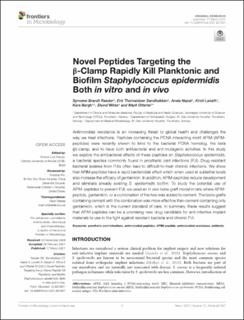| dc.contributor.author | Ræder, Synnøve Brandt | |
| dc.contributor.author | Sandbakken, Erik Thorvaldsen | |
| dc.contributor.author | Nepal, Anala | |
| dc.contributor.author | Løseth, Kirsti | |
| dc.contributor.author | Bergh, Kåre | |
| dc.contributor.author | Witsø, Eivind | |
| dc.contributor.author | Otterlei, Marit | |
| dc.date.accessioned | 2021-10-21T08:05:01Z | |
| dc.date.available | 2021-10-21T08:05:01Z | |
| dc.date.created | 2021-05-03T11:25:22Z | |
| dc.date.issued | 2021 | |
| dc.identifier.issn | 1664-302X | |
| dc.identifier.uri | https://hdl.handle.net/11250/2824366 | |
| dc.description.abstract | Antimicrobial resistance is an increasing threat to global health and challenges the way we treat infections. Peptides containing the PCNA interacting motif APIM (APIM-peptides) were recently shown to bind to the bacterial PCNA homolog, the beta (β)-clamp, and to have both antibacterial and anti-mutagenic activities. In this study we explore the antibacterial effects of these peptides on Staphylococcus epidermidis, a bacterial species commonly found in prosthetic joint infections (PJI). Drug-resistant bacterial isolates from PJIs often lead to difficult-to-treat chronic infections. We show that APIM-peptides have a rapid bactericidal effect which when used at sublethal levels also increase the efficacy of gentamicin. In addition, APIM-peptides reduce development and eliminate already existing S. epidermidis biofilm. To study the potential use of APIM-peptides to prevent PJI, we used an in vivo bone graft model in rats where APIM-peptide, gentamicin, or a combination of the two was added to cement. The bone grafts containing cement with the combination was more effective than cement containing only gentamicin, which is the current standard of care. In summary, these results suggest that APIM-peptides can be a promising new drug candidate for anti-infective implant materials to use in the fight against resistant bacteria and chronic PJI. | en_US |
| dc.language.iso | eng | en_US |
| dc.publisher | Frontiers | en_US |
| dc.rights | Navngivelse 4.0 Internasjonal | * |
| dc.rights.uri | http://creativecommons.org/licenses/by/4.0/deed.no | * |
| dc.title | Novel Peptides Targeting the β-Clamp Rapidly Kill Planktonic and Biofilm Staphylococcus epidermidis Both in vitro and in vivo | en_US |
| dc.type | Peer reviewed | en_US |
| dc.type | Journal article | en_US |
| dc.description.version | publishedVersion | en_US |
| dc.source.journal | Frontiers in Microbiology | en_US |
| dc.identifier.doi | 10.3389/fmicb.2021.631557 | |
| dc.identifier.cristin | 1907736 | |
| cristin.ispublished | true | |
| cristin.fulltext | original | |
| cristin.qualitycode | 2 | |

